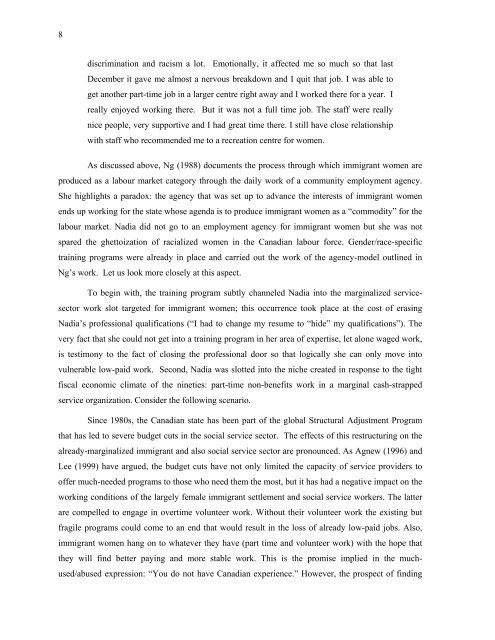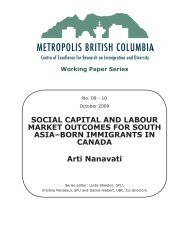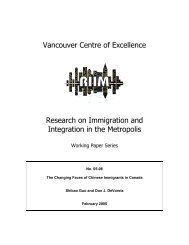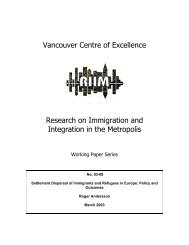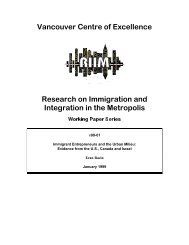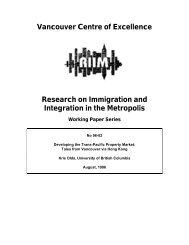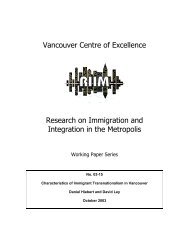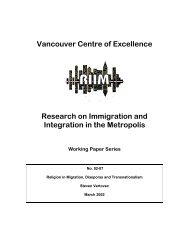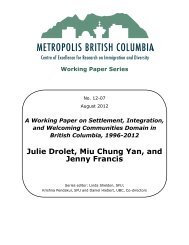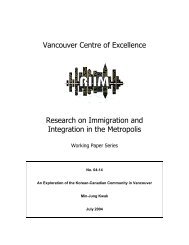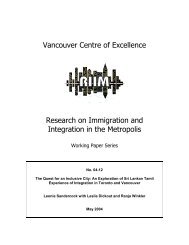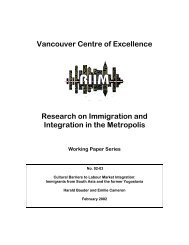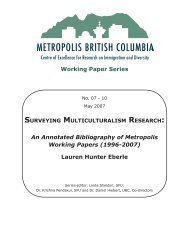Modernization and Global Restructuring of Women's Work
Modernization and Global Restructuring of Women's Work
Modernization and Global Restructuring of Women's Work
You also want an ePaper? Increase the reach of your titles
YUMPU automatically turns print PDFs into web optimized ePapers that Google loves.
8<br />
discrimination <strong>and</strong> racism a lot. Emotionally, it affected me so much so that last<br />
December it gave me almost a nervous breakdown <strong>and</strong> I quit that job. I was able to<br />
get another part-time job in a larger centre right away <strong>and</strong> I worked there for a year. I<br />
really enjoyed working there. But it was not a full time job. The staff were really<br />
nice people, very supportive <strong>and</strong> I had great time there. I still have close relationship<br />
with staff who recommended me to a recreation centre for women.<br />
As discussed above, Ng (1988) documents the process through which immigrant women are<br />
produced as a labour market category through the daily work <strong>of</strong> a community employment agency.<br />
She highlights a paradox: the agency that was set up to advance the interests <strong>of</strong> immigrant women<br />
ends up working for the state whose agenda is to produce immigrant women as a “commodity” for the<br />
labour market. Nadia did not go to an employment agency for immigrant women but she was not<br />
spared the ghettoization <strong>of</strong> racialized women in the Canadian labour force. Gender/race-specific<br />
training programs were already in place <strong>and</strong> carried out the work <strong>of</strong> the agency-model outlined in<br />
Ng’s work. Let us look more closely at this aspect.<br />
To begin with, the training program subtly channeled Nadia into the marginalized servicesector<br />
work slot targeted for immigrant women; this occurrence took place at the cost <strong>of</strong> erasing<br />
Nadia’s pr<strong>of</strong>essional qualifications (“I had to change my resume to “hide” my qualifications”). The<br />
very fact that she could not get into a training program in her area <strong>of</strong> expertise, let alone waged work,<br />
is testimony to the fact <strong>of</strong> closing the pr<strong>of</strong>essional door so that logically she can only move into<br />
vulnerable low-paid work. Second, Nadia was slotted into the niche created in response to the tight<br />
fiscal economic climate <strong>of</strong> the nineties: part-time non-benefits work in a marginal cash-strapped<br />
service organization. Consider the following scenario.<br />
Since 1980s, the Canadian state has been part <strong>of</strong> the global Structural Adjustment Program<br />
that has led to severe budget cuts in the social service sector. The effects <strong>of</strong> this restructuring on the<br />
already-marginalized immigrant <strong>and</strong> also social service sector are pronounced. As Agnew (1996) <strong>and</strong><br />
Lee (1999) have argued, the budget cuts have not only limited the capacity <strong>of</strong> service providers to<br />
<strong>of</strong>fer much-needed programs to those who need them the most, but it has had a negative impact on the<br />
working conditions <strong>of</strong> the largely female immigrant settlement <strong>and</strong> social service workers. The latter<br />
are compelled to engage in overtime volunteer work. Without their volunteer work the existing but<br />
fragile programs could come to an end that would result in the loss <strong>of</strong> already low-paid jobs. Also,<br />
immigrant women hang on to whatever they have (part time <strong>and</strong> volunteer work) with the hope that<br />
they will find better paying <strong>and</strong> more stable work. This is the promise implied in the muchused/abused<br />
expression: “You do not have Canadian experience.” However, the prospect <strong>of</strong> finding


